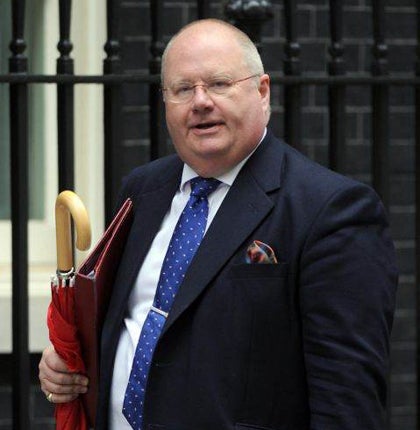Axe-wielding ministers earn Star Chamber seats

Your support helps us to tell the story
From reproductive rights to climate change to Big Tech, The Independent is on the ground when the story is developing. Whether it's investigating the financials of Elon Musk's pro-Trump PAC or producing our latest documentary, 'The A Word', which shines a light on the American women fighting for reproductive rights, we know how important it is to parse out the facts from the messaging.
At such a critical moment in US history, we need reporters on the ground. Your donation allows us to keep sending journalists to speak to both sides of the story.
The Independent is trusted by Americans across the entire political spectrum. And unlike many other quality news outlets, we choose not to lock Americans out of our reporting and analysis with paywalls. We believe quality journalism should be available to everyone, paid for by those who can afford it.
Your support makes all the difference.Five Cabinet ministers agreed yesterday to cut their budgets by about a third as the Treasury axe began to fall ahead of next month's government-wide spending cuts. Eric Pickles, the Communities Secretary, and Caroline Spelman, the Environment Secretary, were rewarded with seats on the Cabinet's Star Chamber, which will impose cuts on those ministers who cannot reach agreement with the Treasury. Both ministers have also been quick to cull quangos since the May election.
Mr Pickles may emerge as a key figure on the cabinet committee, chaired by the Chancellor, George Osborne, in pressing other ministers to fall into line. "He's a bruiser and the Treasury is delighted to get him on board," one insider said last night.
The ministers already serving on the Star Chamber, who have relatively small budgets, have also reached a provisional settlement on their departmental spending for four years. They are William Hague, the Foreign Secretary; Francis Maude and Oliver Letwin at the Cabinet Office; and the Chancellor and Danny Alexander, the Liberal Democrat Chief Treasury Secretary.
The scale of the cuts being planned was also underlined last night by a leaked Cabinet Office document listing 177 taxpayer-funded bodies which face abolition in a "bonfire of the quangos".
The hit-list is said to include the Health Protection Agency, which provides advice on infectious diseases and environmental hazards, the Human Fertilisation and Embryology Authority and the Commission for Rural Communities. Four more bodies will be privatised and 129 merged. Another 94 – including the BBC World Service, the Design Council and the Equalities and Human Rights Commission – are under threat.
The first Whitehall budget deals were announced after the public spending committee met for just over two hours yesterday. Mr Pickles has reached an outline agreement on cutting his £4.4bn budget for housing and regeneration but is still in talks with the Treasury over the other element – the £26.3bn grants to local authorities. No deals on capital spending on building projects have yet been struck with any departments. Precise figures for each ministry will be announced by the Chancellor on 20 October.
The Treasury had expected Kenneth Clarke, the Justice Secretary and former chancellor, to be among the first ministers to settle, winning a seat at the top table. "He's not going to make rash decisions to fall for that trick," one ally said. Mr Clarke, who has a budget of £9.4bn, is believed to be ready to shave spending on legal aid and the probation service, but Tories are nervous about plans to curb the prison population via sentencing reform. Allies say he will not scrap short jail terms.
The biggest headache may be at the Department for Business, where the Lib Dem Vince Cable has been asked by the Treasury to offer more cuts. The Business Secretary worries that axeing schemes that help industry will weaken growth as the country emerges from recession.
About half his £19.6bn budget goes on universities. There is tension between the Tories and Lib Dems over funding them, with the former leaning towards higher top-up fees and the latter favouring graduate tax. Mr Cable is expected to be one of the last ministers to reach agreement. Another problem is Defence, in its first strategic review since 1998. Liam Fox, the Defence Secretary, is due to discuss the options for reducing a £40.4bn budget next Tuesday at a National Security Council meeting chaired by David Cameron.
Theresa May, the Home Secretary, is under pressure to make politically sensitive cuts in the police budget. Iain Duncan Smith, the Work and Pensions Secretary, is battling with Mr Osborne over the benefit system. The Health and International Development budgets will rise in real terms each year.
Join our commenting forum
Join thought-provoking conversations, follow other Independent readers and see their replies
Comments